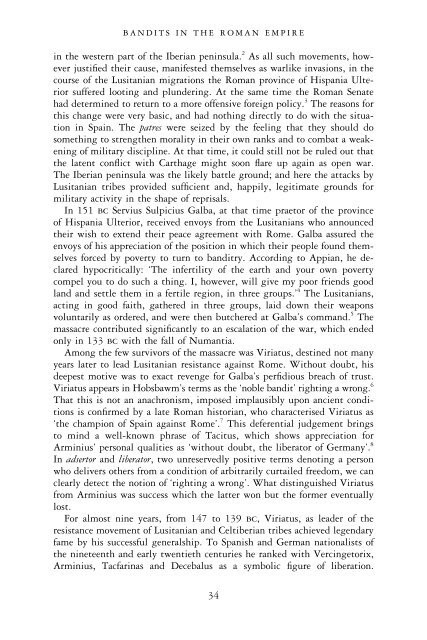You also want an ePaper? Increase the reach of your titles
YUMPU automatically turns print PDFs into web optimized ePapers that Google loves.
BANDITS IN THE ROMAN EMPIRE<br />
in the western part of the Iberian peninsula. 2 As all such movements, however<br />
justified their cause, manifested themselves as warlike invasions, in the<br />
course of the Lusitanian migrations the Roman province of Hispania Ulterior<br />
suffered looting and plundering. At the same time the Roman Senate<br />
had determined to return to a more offensive foreign policy. 3 The reasons for<br />
this change were very basic, and had nothing directly to do with the situation<br />
in Spain. The patres were seized by the feeling that they should do<br />
something to strengthen morality in their own ranks and to combat a weakening<br />
of military discipline. At that time, it could still not be ruled out that<br />
the latent conflict with Carthage might soon flare up again as open war.<br />
The Iberian peninsula was the likely battle ground; and here the attacks by<br />
Lusitanian tribes provided sufficient and, happily, legitimate grounds for<br />
military activity in the shape of reprisals.<br />
In 151 bc Servius Sulpicius Galba, at that time praetor of the province<br />
of Hispania Ulterior, received envoys from the Lusitanians who announced<br />
their wish to extend their peace agreement with Rome. Galba assured the<br />
envoys of his appreciation of the position in which their people found themselves<br />
forced by poverty to turn to banditry. According to Appian, he declared<br />
hypocritically: ‘The infertility of the earth and your own poverty<br />
compel you to do such a thing. I, however, will give my poor friends good<br />
land and settle them in a fertile region, in three groups.’ 4 The Lusitanians,<br />
acting in good faith, gathered in three groups, laid down their weapons<br />
voluntarily as ordered, and were then butchered at Galba’s command. 5 The<br />
massacre contributed significantly to an escalation of the war, which ended<br />
only in 133 bc with the fall of Numantia.<br />
Among the few survivors of the massacre was Viriatus, destined not many<br />
years later to lead Lusitanian resistance against Rome. Without doubt, his<br />
deepest motive was to exact revenge for Galba’s perfidious breach of trust.<br />
Viriatus appears in Hobsbawm’s terms as the ‘noble bandit’ righting a wrong. 6<br />
That this is not an anachronism, imposed implausibly upon ancient conditions<br />
is confirmed by a late Roman historian, who characterised Viriatus as<br />
‘the champion of Spain against Rome’. 7 This deferential judgement brings<br />
to mind a well-known phrase of Tacitus, which shows appreciation for<br />
Arminius’ personal qualities as ‘without doubt, the liberator of Germany’. 8<br />
In adsertor and liberator, two unreservedly positive terms denoting a person<br />
who delivers others from a condition of arbitrarily curtailed freedom, we can<br />
clearly detect the notion of ‘righting a wrong’. What distinguished Viriatus<br />
from Arminius was success which the latter won but the former eventually<br />
lost.<br />
For almost nine years, from 147 to 139 bc, Viriatus, as leader of the<br />
resistance movement of Lusitanian and Celtiberian tribes achieved legendary<br />
fame by his successful generalship. To Spanish and German nationalists of<br />
the nineteenth and early twentieth centuries he ranked with Vercingetorix,<br />
Arminius, Tacfarinas and Decebalus as a symbolic figure of liberation.<br />
34


